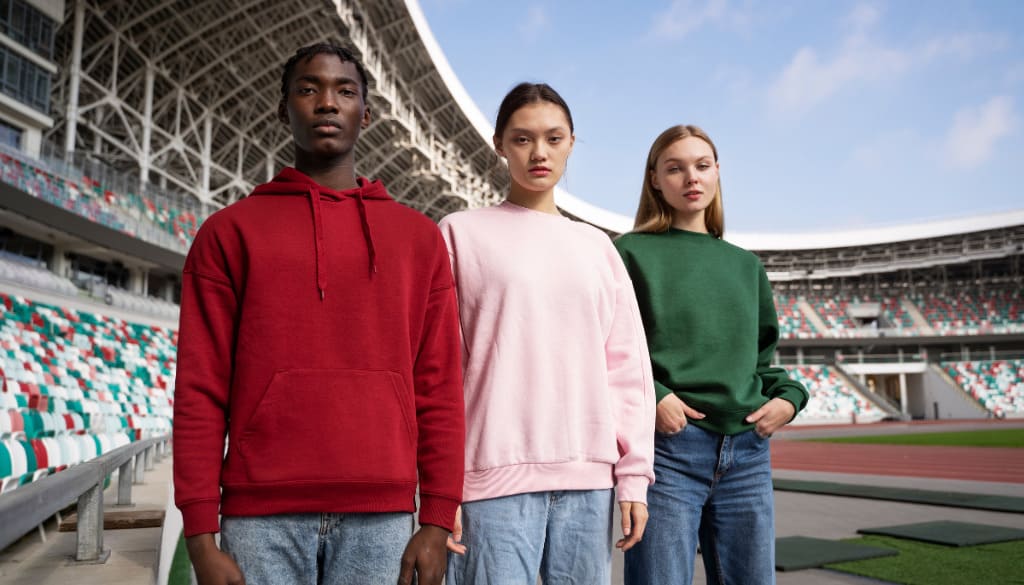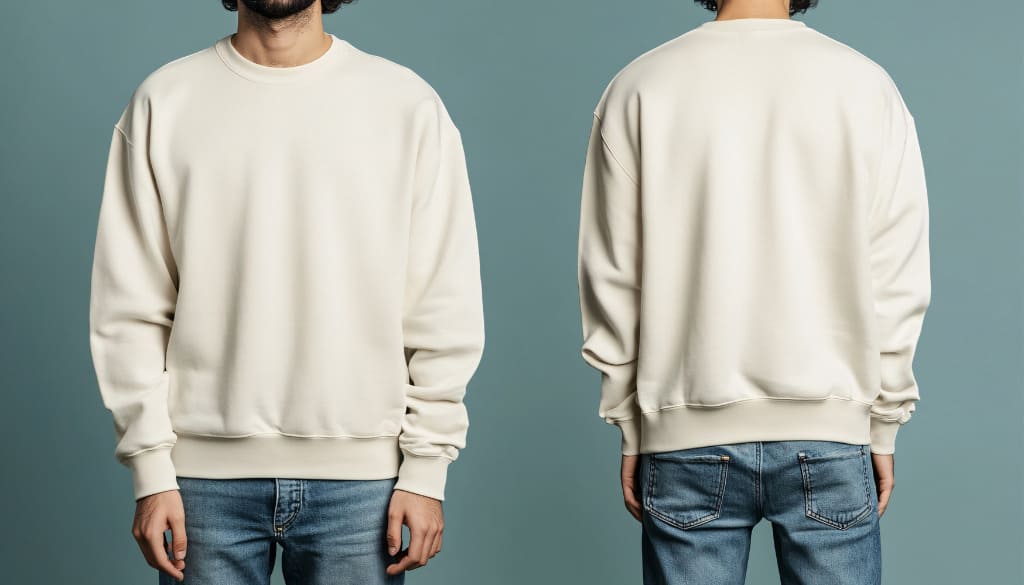When running a Print on Demand (POD) business, choosing high-quality sweatshirt blanks is a key factor that determines both customer experience and the seller’s revenue. Among the countless blank apparel brands available today, Gildan stands out thanks to its competitive pricing, consistent quality, and wide variety of styles. However, many sellers still wonder: “Do Gildan sweatshirts shrink after washing? Are they worth investing in for a POD shop?” In this article, FlashShip will provide a detailed analysis of the material, shrinkage potential, care instructions, and a comparison between Gildan sweatshirts and other brands to help you make a more effective business decision.
Fabric of Gildan Sweatshirts

To understand whether Gildan sweatshirts shrink after washing, we first need to look at their fabric composition. Among the many popular brands on the market, Gildan is trusted by countless sellers thanks to its durability, reasonable price, and consistency. Before evaluating shrinkage resistance or wash durability, it is essential to understand the fabric makeup of Gildan sweatshirts.
1. Fabric Composition of Gildan Sweatshirts
The standout feature and greatest competitive advantage of most Gildan sweatshirt lines lies in their use of a cotton–polyester blend. This combination is not random, but rather a carefully calculated formula designed to optimize the strengths of each fiber, creating a product that is comfortable, durable, and highly cost-effective. Popular examples include:
- Gildan 18000 (most popular unisex sweatshirt): 50% cotton – 50% polyester
- Gildan 12000: 75% cotton – 25% polyester
- Gildan Heavy Blend: 60% cotton – 40% polyester
This smart blend delivers outstanding benefits that 100% cotton fabric alone can hardly achieve:
- 50% Cotton: Cotton, a natural fiber from the cotton plant, provides qualities that consumers love:
- Softness & Breathability: Cotton is renowned for its natural softness. Its breathability helps wearers feel comfortable and not overheated, even in a thick sweatshirt.
- Moisture Absorption: Cotton effectively absorbs sweat, keeping the body dry.
- Ideal for Printing: For the POD industry, this is especially crucial. Cotton’s natural surface allows ink—particularly DTG (Direct to Garment) printing—to adhere well, producing sharp, vibrant, and accurate designs.
- 50% Polyester: Polyester is a synthetic fiber designed to overcome cotton’s inherent weaknesses:
- Durability & Wrinkle Resistance: Polyester is extremely strong, helping sweatshirts maintain their shape through repeated washes, resist wear and tear, and wrinkle far less than 100% cotton. For customers, this means less ironing and easier care.
- Superior Color Retention: Polyester fibers hold dye exceptionally well, preventing rapid fading and keeping garments looking fresh longer.
- Shrinkage Resistance: This is the “main character” in the battle against shrinkage. Polyester is highly stable and unaffected by water or heat in the way cotton is. The presence of 50% polyester helps “lock in” the cotton fibers, dramatically reducing shrinkage.
2. Air Jet Yarn Technology – The “Secret Weapon”
In addition to material composition, Gildan also employs Air Jet Yarn technology. This process uses a high-speed jet of air to spin the yarn, resulting in a smoother fabric surface while significantly reducing pilling after washing.
For POD sellers, this is a major advantage. A sweatshirt that resists pilling looks more premium and lasts longer, enhancing the perceived value of the product. Customers feel like they are buying a high-quality garment rather than a cheap sweatshirt that wears out after just a few uses.
Do Gildan Sweatshirts Shrink?
This is the core question, and the straightforward answer is: Yes, Gildan sweatshirts do shrink, but the shrinkage is very minimal and manageable.
No fabric containing natural cotton fibers is 100% shrink-proof after the first wash. Shrinkage is a natural physical property of cotton when exposed to water and heat. However, thanks to the smart fabric construction we analyzed in Part 1, Gildan has minimized this issue to the greatest extent possible.

1. Understanding “Pre-shrunk” – Does It Really Mean Shrink-Proof?
On the labels of many Gildan products, you will see the word “Pre-shrunk.” What does this mean?
“Pre-shrunk” does not mean the fabric will never shrink again. It means that the fabric has already undergone a controlled wash-and-dry process before being cut and sewn into garments. This process forces the fibers to shrink in advance, so the sweatshirt you receive is far less likely to shrink compared to untreated cotton fabric.
This is a crucial step Gildan takes to ensure size consistency. For POD sellers, this means you can rely more confidently on the size chart.
2. What Is the Actual Shrinkage Rate?
Based on independent testing and feedback from the POD community, Gildan sweatshirts typically shrink about 1–3% after the first wash.
For perspective, let’s take an example with a size L sweatshirt:
- Length (shoulder to hem): ~74 cm
- Width (chest): ~61 cm
If the sweatshirt shrinks 2%, the new measurements would be:
- New length: 74 × 0.98 = ~72.5 cm (shrinks by ~1.5 cm)
- New width: 61 × 0.98 = ~59.8 cm (shrinks by ~1.2 cm)
This change is very minor and virtually unnoticeable to the average wearer. The sweatshirt will still fit comfortably.
Comparison: A sweatshirt made from untreated 100% cotton can shrink by as much as 5–10% or more, which may shorten it by 4–7 cm, enough to turn a perfectly fitting sweatshirt into one that feels uncomfortably tight.
3. Factors Affecting Shrinkage
Although Gildan’s shrinkage rate is low, it can still be influenced by how the garment is washed and dried. The main factors include:
- Water temperature: Hot water is cotton’s number-one enemy. High temperatures cause cotton fibers to contract rapidly and significantly.
- Drying cycle: Similarly, high heat in the dryer will cause additional shrinkage. The hotter the cycle, the greater the shrinkage.
- Mechanical agitation: Excessive spin cycles in the washing machine can stretch, distort, and weaken fibers, indirectly affecting final garment size.
Conclusion
Gildan Heavy Blend sweatshirts maintain very stable sizing, especially compared to 100% cotton products. The shrinkage is minimal and well within acceptable limits. However, to maximize longevity and preserve the original fit, it is essential to follow proper care instructions.
Care Instructions for Washing Gildan Sweatshirts to Prevent Shrinkage

As a POD seller, providing clear care instructions to customers not only demonstrates professionalism but also helps minimize unnecessary complaints. Below is a simple, detailed process for washing and maintaining Gildan sweatshirts to keep them durable, fresh, and in shape. You can include these instructions inside the package or display them in the product description on your website.
Step 1: Turn the Sweatshirt Inside Out Before Washing
This simple step is extremely effective.
- Protects the print: Friction and impact in the washing drum can damage the print surface, causing cracks, fading, or peeling. Turning the sweatshirt inside out maximizes print protection.
- Reduces pilling: Although the Gildan 18000 uses anti-pilling technology, turning the garment inside out further reduces friction on the outer surface, helping it stay smooth.
Step 2: Separate Your Laundry
Do not wash sweatshirts with rough or heavy items like jeans, khakis, or clothing with zippers and metal hooks. These can rub against and damage both the fabric and the print. For best results, wash with softer garments like t-shirts or knitwear.
Step 3: Choose the Right Wash Cycle and Water Temperature
This is the most important step in preventing shrinkage.
- Water temperature: ALWAYS USE COLD WATER. Select the cold wash setting on your washing machine, typically around 30°C (86°F) or lower. Cold water effectively cleans everyday dirt without causing cotton fibers to contract from heat shock.
- Detergent: Use a mild detergent. Avoid strong detergents or applying bleach directly on the print, as these can fade colors and damage the ink.
- Wash cycle: Choose a gentle or delicate cycle if available. This reduces mechanical stress, protecting both the garment’s shape and the print.
Step 4: Dry the Sweatshirt Properly
How you dry the garment is just as important as how you wash it.
- Air drying preferred: This is the best method. After washing, shake the sweatshirt lightly to reduce wrinkles, then hang it in a well-ventilated area away from direct sunlight. Harsh sunlight can fade both the fabric and the print. Drying in the shade helps preserve colors longer.
- If using a dryer: When necessary, choose the lowest heat setting (Tumble Dry Low) or an Air Dry cycle. Remove the sweatshirt as soon as it is dry. Avoid over-drying, as prolonged high heat is the number one cause of shrinkage.
Step 5: Ironing (If Necessary)
Thanks to the 50% polyester blend, Gildan sweatshirts rarely wrinkle. However, if ironing is needed:
- Never iron directly on the print. The high heat from the iron will melt and ruin the design.
- Always turn the sweatshirt inside out and iron on the inner surface.
- Use a low-temperature setting suitable for synthetic fabrics.

Comparing Gildan Sweatshirts with Other Brands
To give POD sellers a well-rounded perspective, let’s compare Gildan sweatshirts with other popular brands such as Hanes, Champion, and Bella+Canvas.
|
Criteria |
Gildan |
Bella+Canvas |
Hanes |
Champion |
|
Material |
Cotton–polyester blend, durable, easy to print on |
Premium cotton, soft, lightweight |
Recycled cotton blend, EcoSmart® eco-friendly |
Heavyweight premium cotton, excellent warmth |
|
Fit |
Basic unisex, versatile styling |
Modern slim-fit, body-flattering |
Relaxed fit, comfortable |
Streetwear-inspired, stylish, bold |
|
Color Range |
Wide variety, from neutrals to vibrant shades |
Trendy, fashion-forward palette |
Basic colors, fewer options |
Limited range, sports-oriented |
|
Durability |
High – minimal shrinkage and wrinkles |
Medium – thinner fabric |
Good, especially EcoSmart® line |
Very high – thick and long-lasting |
|
Printability |
Excellent – smooth surface, holds color well |
Good, but requires premium inks for best results |
Decent – suitable for basic prints |
Fairly limited – thick fabric makes fine details harder |
|
Price Positioning |
Affordable, competitive |
Higher, positioned as fashion-forward |
Mid-range, suitable for everyday needs |
High, targeting the premium segment |
|
Target Audience |
POD sellers, mid-range brands, general consumers |
Premium POD sellers, fashion brands |
Everyday consumers, basic wear lovers |
Premium customers, streetwear enthusiasts |
|
Key Strengths |
Affordable, consistent quality, easy to print |
Soft fabric, stylish, trendy |
Eco-friendly, durable |
Strong brand identity, bold streetwear look |
|
Weaknesses |
Basic designs, less innovative |
Higher cost, harder to maximize POD profit |
Limited color and style variety |
High price, less suitable for beginner POD sellers |
Choosing high-quality blanks like Gildan is only the first step in your POD journey. To transform your designs into perfect products that reach customers, the key factor lies in your fulfillment partner: a reliable print shop that offers fast order processing, consistent quality, and dedicated support. The right partner will help you save time, optimize costs, and strengthen your competitive advantage.
FlashShip provides an all-in-one solution for printing, packaging, shipping, and brand customization tailored for the U.S. market. This allows POD sellers to focus entirely on design creativity, marketing, and customer care, while every aspect of logistics is handled professionally and efficiently.
With FlashShip, you don’t just get quality blanks—you gain a trustworthy partner to sustainably scale your business and build a long-term brand.
Sign up and receive detailed consultation at: https://seller.flashship.net
Hotline: (+84) 943 024 337 for immediate support.
See more articles:

